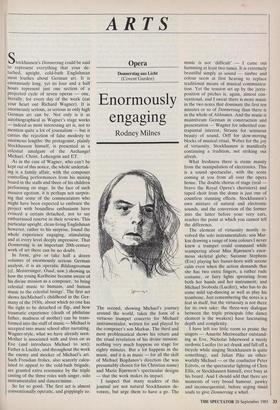ARTS
Opera
Enormously engaging
Rodney Milnes
Stockhausen's Donnerstag could be said to represent everything that your de- tached, upright, cold-bath Englishman most loathes about German art. It is enormously long, yet its four and a half hours represent just one section of a projected cycle of seven operas — one, literally, for every day of the week (eat your heart out Richard Wagner). It is enormously serious, as serious as only high German art can be. Not only is it as autobiographical as Wagner's stage works — indeed as most interesting art is, not to mention quite a lot of journalism — but it carries the rejection of false modesty to enormous lengths: the protagonist, plainly Stockhausen himself, is presented as a celestial amalgam of the Archangel Michael, Christ, Lohengrin and ET.
As in the case of Wagner, who can't be kept out of this notice, the whole undertak- ing is a family affair, with the composer controlling performances from his mixing board in the stalls and three of his children performing on stage. In the face of such massive egotism, it is perhaps not surpris- ing that some of the commentators who might have been expected to embrace the project with boundless enthusiasm have evinced a certain detached, not to say embarrassed reserve in their reviews. This particular upright, clean-living Englishman however, rather to his surprise, found the whole experience engaging, stimulating and at every level deeply impressive. That Donnerstag is an important 20th-century work of art there can be no doubt.
In form, give or take half a dozen volumes of enormously serious German analysis, it is an operatic Bildungsroman (cf. Meistersinger, Osud, usw.) showing us how the young Karlheinz became aware of his divine mission as a composer, 'to bring celestial music to humans, and human music to the celestial beings'. The first act shows his/Michael's childhood in the Ger- many of the 1930s, about which no one has the right to be detached or flip, and how traumatic experience (death of philistine father, madness of mother) can be trans- formed into the stuff of music — Michael is accepted into music school after narrating, Wagner-style, what we have already seen. Mother is associated with and lives on as Eve (and introduces Michael to sex); Father is Lucifer, and throughout the work the enemy and mocker of Michael's art. Such Freudian frolics, also scarcely calcu- lated to appeal to the cold-bath brigade, are granted extra resonance by the triple casting of the three roles with singer, solo instrumentalist and dancer/mime.
So far so good. The first act is almost conventionally operatic, and grippingly so. The second, showing Michael's journey around the world, takes the form of a virtuoso trumpet concerto for Michael/ instrumentalist, written for and played by the composer's son Markus. The third and most problematical shows his return and the ritual revelation of his divine mission: nothing very much happens on stage for eighty minutes. But a lot happens in the music, and it is as music — for all the skill of Michael Bogdanov's direction (he was presumably chosen for his Christian name) and Maria BjOrnson's spectacular designs — that the work makes its impact.
I suspect that many readers of this journal are not natural Stockhausen de- votees, but urge them to have a go. The
music is not 'difficult' — I came out humming at least two tunes. It is extremely beautiful simply as sound — timbre and colour seem at first hearing to replace traditional means of musical communica- tion. Yet the tension set up by the juxta- position of pitches is, again, almost con- ventional, and I swear there is more music in the two notes that dominate the first ten minutes or so of Donnerstag than there is in the whole of Akhnaten. And the music is mainstream German in construction and presentation — Wagner for inherited con- trapuntal interest, Strauss for sensuous beauty of sound, Orff for slow-moving blocks of musical ritual, Weber for the joy of virtuosity. Stockhausen is manifestly continuing a tradition, not striking out afresh.
What freshness there is stems mainly from the manipulation of electronics. This is a sound spectacular, with the score coming at you from all over the opera house. The double chorus of stage (real bravo the Royal Opera's choristers) and taped choir from the dome is just one of countless stunning effects. Stockhausen's own mixture of natural and electronic sounds, and the conversion of the former into the latter before your very ears, reaches the point at which you cannot tell the difference.
The element of virtuosity mostly in- volved the solo instrumentalists: son Mar- kus drawing a range of tone colours I never knew a trumpet could command while scampering about Miss Bjornson's enor- mous skeletal globe; Suzanne Stephens (Eve) playing her basset-horn with serene calm even when the action demands that she has two extra fingers, a rather rude costume, or fairy lights sprouting from both her hands and her instrument; and Michael Svoboda (Lucifer), who has to do some mild tap-dancing as well as play his trombone. Just remembering the notes is a feat in itself, but the virtuosity is not there for its own sake: the three-way dialogue between the triple principals (the dance element is the weakest) have fascinating depth and complexity.
I have left too little room to praise the singers — Annette Meriweather outstand- ing as Eve, Nicholas Isherwood a nicely sardonic Lucifer (to act drunk and fall off a bicycle while singing Stockhausen is quite something), and Julian Pike an other- worldly Michael — or the conductor Peter Edtvds, or the spectacular lighting of Chris Ellis, or Stockhausen himself, ever busy at his board. And I should add that there are moments of very broad humour, pawky and inconsequential, before urging timid souls to give Donnerstag a whirl.














































 Previous page
Previous page